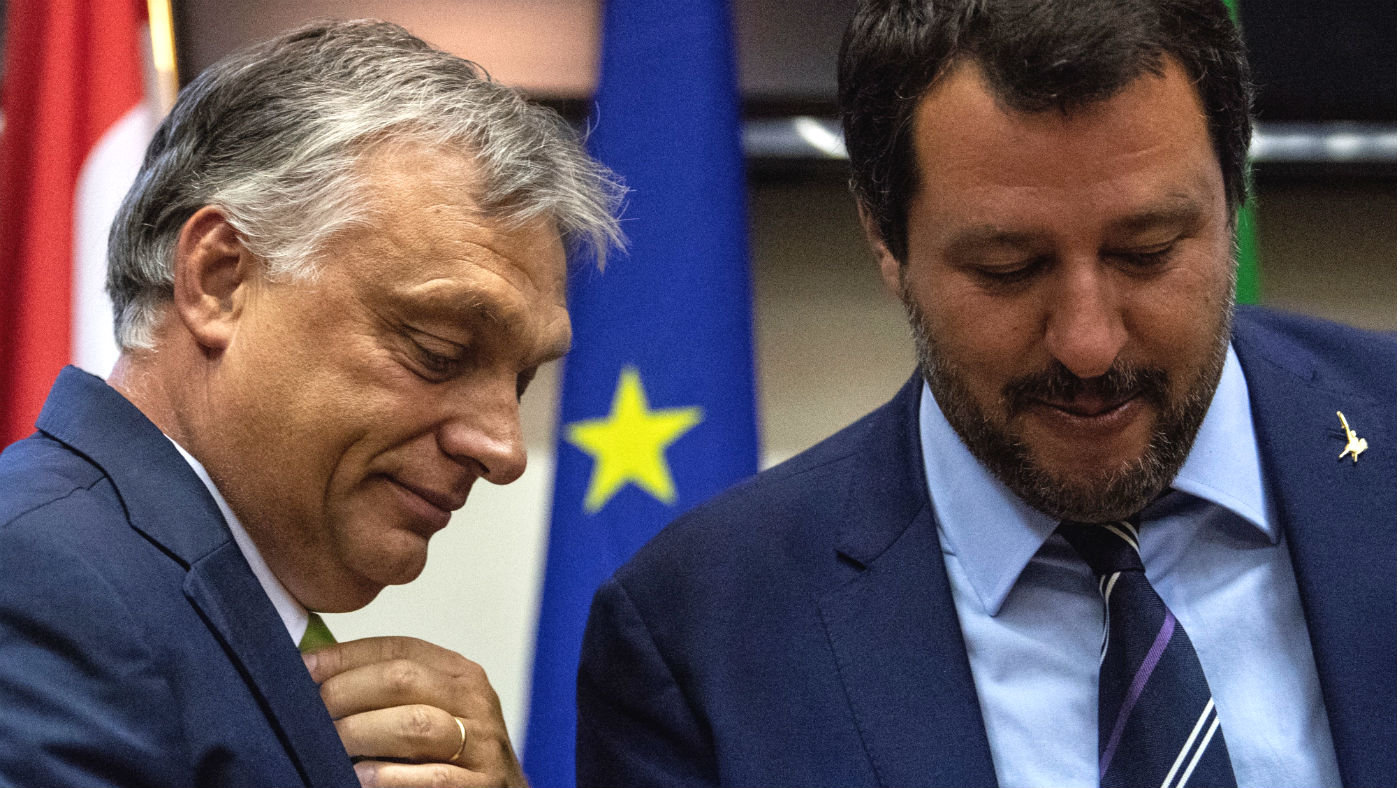Far-right ‘axis’ aims to take control of EU
Hungary, Italy and Poland seek anti-immigration majority at upcoming European Parliamentary elections

A free daily email with the biggest news stories of the day – and the best features from TheWeek.com
You are now subscribed
Your newsletter sign-up was successful
Hungary’s prime minister, Viktor Orban, has joined fellow far-right leaders from Italy and Poland in proposing a new anti-immigration “axis” that will take control of the EU at the upcoming European Parliamentary elections.
Earlier this week on a visit to Warsaw, Italy’s nationalist Deputy Prime Minister Matteo Salvini called for a “European Spring” to overthrow the Franco-German centre-right hold over the continent.
“We are preparing a new equilibrium and new energy in Europe and Poland and Italy, absolutely, will lead this new European spring,” Salvini said in the Polish capital, adding that “we have a new plan for Europe” intended to replace the dominant “French-German axis”.
The Week
Escape your echo chamber. Get the facts behind the news, plus analysis from multiple perspectives.

Sign up for The Week's Free Newsletters
From our morning news briefing to a weekly Good News Newsletter, get the best of The Week delivered directly to your inbox.
From our morning news briefing to a weekly Good News Newsletter, get the best of The Week delivered directly to your inbox.
Since taking office in 2015, Poland’s right-wing PiS government has put the country “on a collision course with the EU over a string of controversial judicial reforms” says Euractiv News.
Warsaw recently backed down from its reform aimed at retiring Supreme Court judges, under pressure from Brussels. The EU’s top court ruled it threatened to undermine the independence of the courts.
“Rome has also had numerous spats with Brussels,” reports the Daily Mail, “notably over immigration and the country's efforts to implement a big-spending budget to apply populist measures.”
Now Orban, whose own government has faced censure from Brussels, has indicated his intention to join the Rome-Warsaw axis, calling it “one of the most wonderful developments of the year so far”.
A free daily email with the biggest news stories of the day – and the best features from TheWeek.com
“This is a topic that is radically transforming European politics, it’s the defining political process in Europe,” Orban said at a rare press conference in Budapest yesterday. “The party structures, traditionally left or right, are being taken over by a different dimension – those for migration and against immigration.”
Orban said Hungary’s goal was to gain an anti-immigration majority in the European parliament, then in the executive European commission, and later, as national elections change the continent’s political landscape, the European council, where national leaders make the most important EU decisions.
Austria’s right-wing chancellor Sebastian Kurz last year called for an anti-immigration “axis” using the same language. Speaking alongside the right-wing Bavarian CSU party he cited Italy and Germany as possible allies.
Polls suggest that a far-right group could credibly become the second largest grouping in the trans-national parliament, “though divisions between different parties in different countries could prevent them from coalescing around a single banner”, says The Independent.
Nevertheless, “this could seriously slant policy direction for the EU - as it did over the rescuing of migrants in the Mediterranean”, says The Sun.
Under pressure from Italy, the bloc started condemning NGO-run rescue boats for picking up drowning or stranded migrants.
-
 How to Get to Heaven from Belfast: a ‘highly entertaining ride’
How to Get to Heaven from Belfast: a ‘highly entertaining ride’The Week Recommends Mystery-comedy from the creator of Derry Girls should be ‘your new binge-watch’
-
 The 8 best TV shows of the 1960s
The 8 best TV shows of the 1960sThe standout shows of this decade take viewers from outer space to the Wild West
-
 Microdramas are booming
Microdramas are boomingUnder the radar Scroll to watch a whole movie
-
 Rubio boosts Orbán ahead of Hungary election
Rubio boosts Orbán ahead of Hungary electionSpeed Read Far-right nationalist Prime Minister Viktor Orbán is facing a tough re-election fight after many years in power
-
 Switzerland could vote to cap its population
Switzerland could vote to cap its populationUnder the Radar Swiss People’s Party proposes referendum on radical anti-immigration measure to limit residents to 10 million
-
 Epstein files topple law CEO, roil UK government
Epstein files topple law CEO, roil UK governmentSpeed Read Peter Mandelson, Britain’s former ambassador to the US, is caught up in the scandal
-
 Iran and US prepare to meet after skirmishes
Iran and US prepare to meet after skirmishesSpeed Read The incident comes amid heightened tensions in the Middle East
-
 Israel retrieves final hostage’s body from Gaza
Israel retrieves final hostage’s body from GazaSpeed Read The 24-year-old police officer was killed during the initial Hamas attack
-
 China’s Xi targets top general in growing purge
China’s Xi targets top general in growing purgeSpeed Read Zhang Youxia is being investigated over ‘grave violations’ of the law
-
 Panama and Canada are negotiating over a crucial copper mine
Panama and Canada are negotiating over a crucial copper mineIn the Spotlight Panama is set to make a final decision on the mine this summer
-
 Why Greenland’s natural resources are nearly impossible to mine
Why Greenland’s natural resources are nearly impossible to mineThe Explainer The country’s natural landscape makes the task extremely difficult